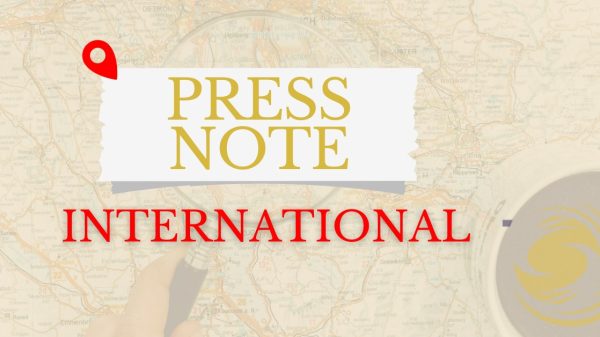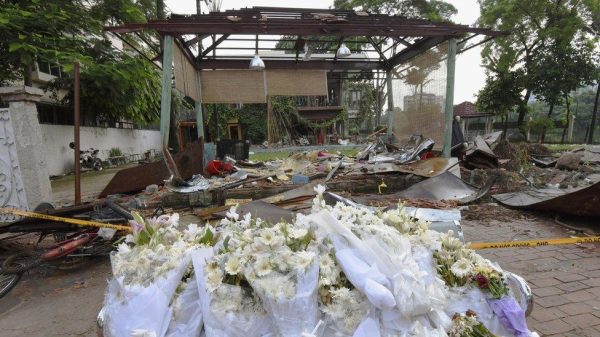China’s ‘Two Sessions’ Convene Amid Global Uncertainty

- Update Time : Wednesday, March 5, 2025

President Trump Proposes Hefty Tariffs Amid Global Economic Tensions
Financial Times,
In a move poised to reshape international trade dynamics, President Donald Trump has announced the implementation of substantial tariffs targeting major U.S. trading partners. Effective immediately, a 25% duty has been imposed on imports from Canada and Mexico, alongside a 10% levy on Chinese goods. These measures are part of the administration’s strategy to address perceived trade imbalances and bolster domestic manufacturing.
The president acknowledged that these tariffs might cause “a little disturbance” in the short term but emphasized their necessity for restoring America’s economic strength. He stated that such actions are essential to make America “wealthy and great again.” The business community, consumers, and particularly U.S. farmers have expressed concerns over potential disruptions and increased costs resulting from these tariffs. The European Union has also voiced apprehensions, warning that these measures could disrupt global trade and integrated supply chains.
The administration remains steadfast in its approach, asserting that these tariffs are a critical component of its broader economic agenda. As the global community reacts, the long-term impacts of these policies on international trade relations and the U.S. economy remain to be seen.
Global Markets React to Escalating Trade Tensions
Reuters,
Global financial markets are experiencing heightened volatility as escalating trade tensions, spurred by new U.S. tariffs, raise concerns about a potential global economic downturn. European markets have seen significant declines, with Frankfurt experiencing its worst session in nearly three years, plunging over 3.5%. London and Paris have also faced substantial losses, shedding 1.3% and 1.9% respectively.
In the United States, the S&P 500 index has witnessed widespread declines across various sectors, with industrial giants like Boeing and American Express suffering notable losses. Analysts caution that prolonged trade disputes could lead to economic recessions and bear markets. The European Union has expressed serious concerns, indicating that such tariffs threaten global trade stability and integrated supply chains.
As the situation unfolds, investors and policymakers worldwide are closely monitoring developments, bracing for potential long-term impacts on the global economy.
China’s ‘Two Sessions’ Convene Amid Global Uncertainty
The Guardian,
China’s annual parliamentary session, known as the “Two Sessions,” has commenced in Beijing, bringing together thousands of delegates under stringent security measures. This pivotal event in China’s political calendar involves the Chinese People’s Political Consultative Conference and the National People’s Congress. This year’s session occurs against a backdrop of global uncertainties, including U.S.-Ukraine tensions and a fragile Gaza ceasefire.
Economically, China is grappling with the repercussions of a tariff war with the United States. Despite these challenges, the leadership is focusing on stimulating growth and innovation, particularly in high-tech sectors. A notable highlight is DeepSeek, an AI company making significant strides with substantial state backing. The leadership’s emphasis on technological advancement underscores China’s strategic shift towards self-reliance in critical industries.
As the sessions progress, the global community watches closely for policy decisions that could influence international relations and economic trends.
Fragile Ceasefire in Gaza Faces Uncertainty
The Guardian,
The ceasefire in Gaza, initially established to facilitate negotiations for a lasting truce, has reached a critical juncture as talks have stalled. Israel has implemented an aid embargo on Gaza and is considering escalating measures, including cutting off electricity and water supplies. The ceasefire aimed to create a conducive environment for dialogue, but both sides are now preparing for potential renewed conflict.
The continuation of the ceasefire largely hinges on international diplomatic efforts, particularly from the United States. President Trump’s recent suspension of all U.S. military aid to Ukraine has strained U.S.-Ukraine relations, adding complexity to the geopolitical landscape. The international community remains concerned about the humanitarian implications and the potential for further escalation in the region.
China Sets 2025 Economic Growth Target Amid Trade Tensions
Associated Press,
China has announced an economic growth target of “around 5%” for 2025, despite escalating trade tensions with the United States. Premier Li Qiang, addressing the National People’s Congress in Beijing, emphasized the need for enhanced fiscal stimulus to support consumption and mitigate the impact of the ongoing trade war. The government plans to increase the budget deficit to 4% of GDP, up from 3% the previous year, and issue 3 trillion yuan in special treasury bonds. These funds are earmarked for consumer subsidies, business equipment upgrades, and strategic investment projects. Additionally, local government special bonds issuance is expected to rise, with estimates ranging from 4.5 to 4.7 trillion yuan. Employment remains a priority, with a goal of creating approximately 12 million new urban jobs and reducing the unemployment rate target to about 5%. The inflation target has been set around 2%, reflecting minimal consumer price increases in the previous year. Premier Li highlighted the importance of bolstering domestic demand and innovation to navigate “changes unseen in a century,” underscoring the challenges posed by external uncertainties and internal economic pressures.
Arab Summit Endorses Egypt’s Gaza Reconstruction Initiative
Anadolu Agency,
In a significant diplomatic development, the Arab Summit convened in Cairo has unanimously adopted Egypt’s comprehensive plan for the reconstruction of Gaza. This unified initiative aims to address the extensive infrastructural damage resulting from recent conflicts and improve living conditions for the Palestinian population. The plan includes rebuilding residential areas, restoring essential services, and revitalizing the local economy through targeted investments. Egypt’s leadership in this endeavor underscores its pivotal role in regional stability and its commitment to supporting the Palestinian cause. The summit’s endorsement reflects a collective effort among Arab nations to collaborate on humanitarian and developmental projects, fostering hope for sustainable peace and prosperity in the region.










Leave a Reply